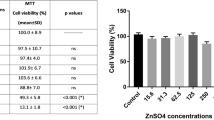Abstract
Objective
To investigate the antiproliferative effects of zinc-citrate compound on hormone refractory prostate cancer (HRPC).
Methods
HRPC cell line (DU145) and normal prostate cell line (RWPE-1) were treated with zinc, citrate and zinc-citrate compound at different time intervals and concentrations to investigate the effect of zinc-citrate compound. Mitochondrial (m)-aconitase activity was determined using aconitase assay. DNA laddering analysis was performed to investigate apoptosis of DU145 cells. Molecular mechanism of apoptosis was investigated by Western blot analysis of P53, P21waf1, Bcl-2, Bcl-xL and Bax, and also caspase-3 activity analysis.
Results
Treatment with zinc-citrate compound resulted in a time- and dose-dependent decrease in cell number of DU145 cells in comparison with RWPE-1. M-aconitase activity was significantly decreased. DNA laddering analysis indicated apoptosis of DU145 cells. Zinc-citrate compound increased the expression of P21waf1 and P53, and reduced the expression of Bcl-2 and Bcl-xL proteins but induced the expression of Bax protein. Zinc-citrate compound induced apoptosis of DU145 cells by activation of the caspase-3 pathway.
Conclusion
Zinc-citrate compound can induce apoptotic cell death in DU145, by caspase-3 activation through up-regulation of apoptotic proteins and down-regulation of antiapoptotic proteins.
Similar content being viewed by others
References
Grönberg H. Prostate cancer epidemiology. Lancet 2003; 361:859–864.
Moul JW. Variables in predicting survival based on treating PSA-only relapse. Urol Oncol 2003; 21:292–304.
Powell SR. The antioxidant properties of zinc. J Nutr 2000; 130:1447–1454.
Truong-Tran AQ, Carter J, Ruffin RE, et al. The role of zinc in caspase activation and apoptotic cell death. Biometals 2001; 14:315–330.
Costello LC, Franklin RB. Novel role of zinc in the regulation of prostate citrate metabolism and its implications in prostate cancer. Prostate 1998; 35:285–296.
Pabon M, Lonnerdal, B. Effect of citrate on zinc bioavailability from milk, milk fractions and infant formulas. Nutr Res 1992; 13:103–111.
Provinciali M, Stefano GD, Fabris N. Dose-dependent opposite effect of zinc on apoptosis in mouse thymocytes. Int J Immunopharmcol 1995; 17:735–744.
Schrantz N, Auffredou MT, Bourgeade MF, et al. Zinc-mediated regulation of caspase activity: dose-dependent inhibition or activation of caspase-3 in the human Burkitt lymphoma B cells (Ramos). Cell Death Differ 2001; 8:152–161.
Costello LC, Liu Y, Franklin RB, et al. Zinc inhibition of mitochondrial aconitase and its importance in citrate metabolism of prostate epithelial cells. J Biol Chem 1997; 272:28875–28881.
Costello LC, Franklin RB, Narayan P. Citrate in the diagnosis of prostate cancer. Prostate 1999; 38:237–245.
Whelan P, Walker BE, Kelleher J. Zinc, vitamin A, and prostate cancer. Br J Urol 1983; 55:525–528.
Mocchegiani E, Muzzioli M, Giacconi R. Zinc, metallothioneins, immune responses, survival and ageing. Biogerontology 2000; 1:133–143.
Franklin RB, Ma J, Zou J, et al. Human ZIP1 is a major zinc uptake transpoter for the accumulation of zinc in prostate cells. J Inorg Biochem 2003; 96:435–442.
el-Deiry WS, Tokino T, Velculescu VE, et al. WAF1, a potential mediator of p53 tumor suppression. Cell 1993; 19:817–825.
**ong Y, Hannon GJ, Zhang H, et al. p21 is a universal inhibitor of cyclin kinases. Nature 1993; 16:701–704
Kluck RM, Bossy-Wetzel E, Green DR, et al. The release of cytochrome c from mitochondria: a primary site for Bcl-2 regulation of apoptosis. Science 1997; 275:1132–1136.
St Clair EG, Anderson SJ, Oltvai ZN. Bcl-2 counters apoptosis by Bax heterodimerization-dependent and -independent mechanisms in the T-cell lineage. J Biol Chem 1997; 272:29347–29355.
Author information
Authors and Affiliations
Corresponding author
Additional information
This study was supported by the National Research & Development Program for Cancer Control, Ministry for Health and Welfare, Republic of Korea (No. 1020080) and the Catholic Medical Center Research Foundation 2010.
Rights and permissions
About this article
Cite this article
Hong, S.H., Choi, Y.S., Cho, H.J. et al. Antiproliferative effects of zinc-citrate compound on hormone refractory prostate cancer. Chin. J. Cancer Res. 24, 124–129 (2012). https://doi.org/10.1007/s11670-012-0124-9
Received:
Accepted:
Published:
Issue Date:
DOI: https://doi.org/10.1007/s11670-012-0124-9




